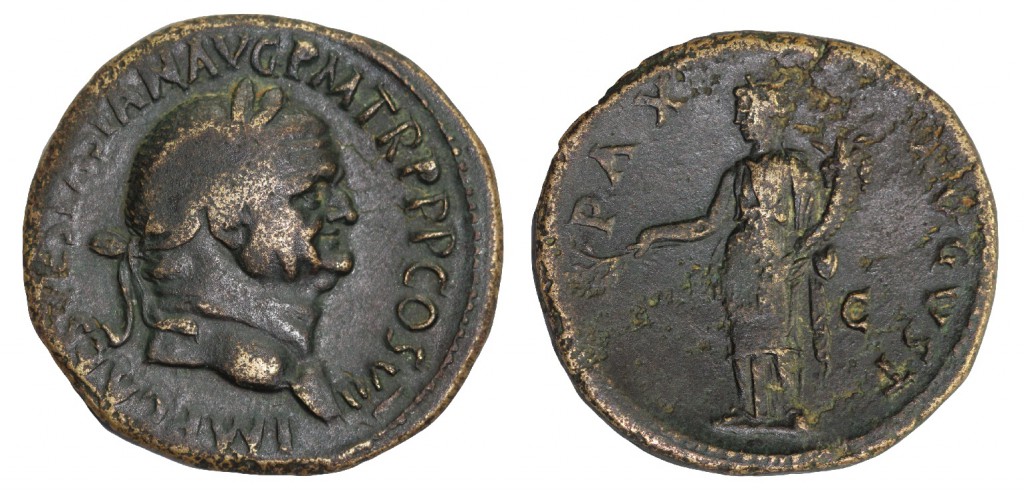July 3, 2015, by Will Leveritt
On this day in AD69 Vespasian was acclaimed emperor by his troops in Judaea
Text by Oleg Petrenko
Image © Mint Imperials
In AD 68 the suicide of the emperor Nero was followed by a short period of civil war lasting from June of 68 to December of 69. Rome witnessed the rise and fall of Galba, Vitellius and Otho until the final accession of Vespasian, the first of the Flavian dynasty.

AR sestertius of Vespasian. Obverse has laureate head of emperor r., IMP CAES VESPASIAN AVG P M TR P P P COS VII. Reverse has Pax left holding cornucopia and branch, PAX AVGVST / SC. 35mm, 26.1g, 6 o’clock.
The acclamation of Vespasian had occurred at Alexandria on July 1st. Shortly thereafter Vespasian and Mucianus – a prominent senator, governor of Syria, and a man who had been instrumental in persuading Vespasian to bid for the imperial throne – held a conference at Berytus, planning their campaign in mid-July. Many prominent individuals attended the conference, such as King Herod Agrippa II, and the other representatives of other eastern clients of the Julio- Claudians such as Antiochus IV of Commagene.
The first official to formally proclaim Vespasian was the prefect of Egypt, Tiberius Iulius Alexander. His endorsement was especially critical, since he commanded two legions and, as prefect, controlled the shipments of Egyptian grain to Rome. His decision to swear allegiance to Vespasian, despite the fact that the Senate had officially sanctioned the accession of Vitellius, seems to have encouraged other prominent military commanders around the empire to follow suit.
Vitellius was eventually murdered in Rome by troops loyal to Vespasian, who was formally approved by the Senate on 21 December, 69 although Vespasian himself seems to have dated the beginning of his reign to his acclamation on 1st July, perhaps reflecting his acknowledgement of the importance of the army in his rise to power.
This confirmation signalled the conclusion of a five-act tragedy that had occupied the Roman world for the better part of two years. Vespasian did not meet any direct threat to his imperial power after the death of Vitellius. He became the founder of the Flavian dynasty that succeeded the Julio-Claudians and would last until the murder of his younger son Domitian, in 96. Vespasian himself died of natural causes in 79, with the famous last words, “Vae, puto deus fio” (“Dear me, I think I am turning into a god…”).
No comments yet, fill out a comment to be the first

Leave a Reply